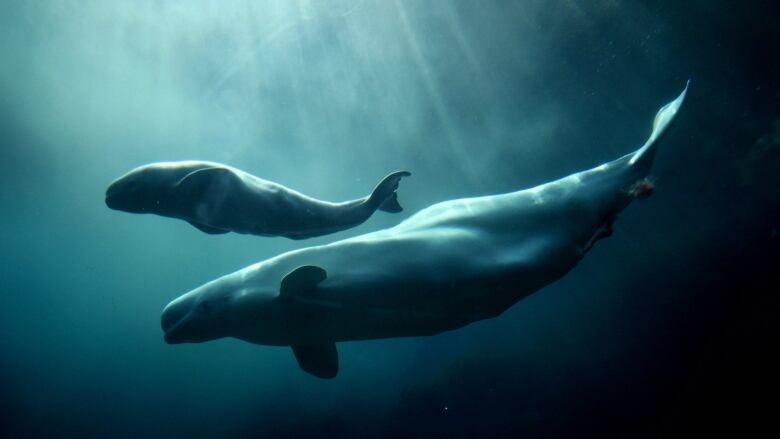World's 1st captive whale retirement home could be in Nova Scotia or B.C.
Animal behaviour specialist says life in captivity is detrimental to whales

A U.S.-basednon-profit group is looking to build the world's first retirement facility for captive whales and dolphins andmembers are eyeing Nova Scotia or B.C. waters as the possible location for the sanctuary.
The plan is to isolate a 26-hectare section of oceanusing nets to block the mouth of a cove, inlet or bay, in an area where there is enough depth for the animals to dive. There would be facilities on land to house staff who would co-ordinate feeding and health care for the animals.
Members of The Whale Sanctuary Project, incorporated in Washington, D.C., are also considering two U.S. jurisdictions for the sanctuary: Washington state and Maine. They expect to release a short list of possible locations in early 2017.
"There are permanent sanctuaries for all kinds of wild animals: elephants, chimpanzeesand bears," said organization president Lori Marino. "There are none in the world for cetaceans [toothed whales], so we need to fill that gap."
'Stuck in concrete tanks'

Life in captivity is detrimental to whales and dolphins, said Marino, a neuroscientist and former faculty member at Emory Universityin Atlanta who specializes in animal behavior and intelligence.
Whales and dolphins are going to "continue to be stuck in concrete tanks, if we don't do something about it," she said.
"If we want to increase the welfare" of these animals, they need to have a place to go, she said. "Most of them cannot just be dumped back into the ocean. They just don't have the life skills to survive."
A sanctuary, likethe one being proposed, would be the next best thing to being returned to the wild, Marino said.
Hal Whitehead, a marine biologist and researcher at Halifax's Dalhousie University,said in an emailthat theproposal could work.
"I think it is pretty feasible. They seem to have done good research, and realize the challenges," said Whitehead.
He said there could be a number of benefits for Nova Scotia if the sanctuary proposal goes ahead.
"It could provide employment, attract tourists, and would be a great focus for some of the many marine biology students at Dalhousie and other Nova Scotia universities," said Whitehead.
Impact on ecosystem
A spokesman for the Department of Fisheries and Oceans said in an email Wednesday that the department has no involvement in the discussion.
"Should a proposal be put forward it will be reviewed at that time," said Stephen Bornais.
Marino said group members are being careful to ensure there would be minimal impact on the existing ecosystemand other wildlife. "We don't want to come in and create more problems," she said.
Marino has visited Nova Scotia twice in the last year to assess possible locations for the project, and she said the reaction from people on the ground has been "overwhelmingly positive."
The plan involves building an education centre on site, so that visitors can enjoy the animals from a distance. "We can actually bring an authentic experience to visitors, unlike what they get in aquariums and marine parks."
Marino estimated it would cost approximately $20 million USto get the project up and running.
"It sounds like a lot, and it is," she said. "But it's doable." She said group members plan to start fundraising in earnest over the next two years.
With files from the CBC's Information Morning












_(720p).jpg)


 OFFICIAL HD MUSIC VIDEO.jpg)
.jpg)



























































































